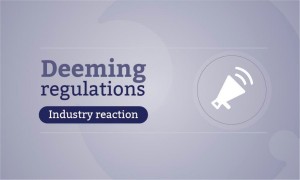 Initial industry reaction to the publication of the U.S. Food and Drug Administration (FDA) rule establishing its authority to regulated e-cigarettes has been mixed.
Initial industry reaction to the publication of the U.S. Food and Drug Administration (FDA) rule establishing its authority to regulated e-cigarettes has been mixed.
Opinions have fallen on largely predictable lines, with the document being greeted with enthusiasm by a number of health charities and public health advocates while being looked upon with dismay by vaping associations and smaller e-cigarette businesses.
Noted e-cigarette opponents such as Stanton Glantz, professor of medicine and director of the Center for Tobacco Control Research and Education at the University of California San Francisco, welcomed the decision, calling it “a step forward”.
Large health charities such as American Heart Association were also happy. The organisation pointed to the rise in youth vaping as a worrying sign for the future of heart health. Indeed, the FDA should have gone further, banning flavours for e-cigs and making child-resistant packaging compulsory, said American Heart Association CEO Nancy Brown.
“All tobacco products present risk. That’s why it was absolutely necessary for the FDA to assert its authority over these products. We commend the FDA for taking this significant step to protect the cardiovascular health of Americans and prevent children from starting down a dangerous and addictive path,” she added.
“Now, thanks to this new rule, more potential tobacco users will hopefully be steered clear from taking that first puff during adolescence. Research and tobacco surveillance shows that effective regulation of tobacco products helps reduce tobacco use in both youths and adults.”
But the ruling was also met with heavy opposition. Michael Siegel, professor in the Department of Community Health Sciences at Boston University School of Public Health, called the ruling a disaster for public health and said the FDA may as well have called it the “Cigarette Smoking Promotion Regulations of 2016”.
Chris Hughes, principal of the Pennsylvania State Trade Association for Small Vapor Products Businesses, voiced the concerns of many small business owners in the e-cigarette sector when he described the FDA’s regulations as starling and horrible. They made a particular contrast coming so closely on the heels of the UK’s Royal College of Physicians’ endorsement of e-cigarettes in the previous week, Hughes said.
“Horrible”
“This move by the FDA could wind up banning products that modern science seems to agree are dramatically less harmful than smoking, while at the same time leaving deadly combustible cigarettes on the market,” he told ECigIntelligence. “It is horrible from both the perspective of policy, and public health.”
The Smoke Free Alternatives Trade Association (SFATA) echoed Hughes in being startled by the contrast between the FDA’s regulations and the recent UK Royal College of Physicians’ advice. The organisation also expressed worries about the cost of compliance and whether any e-cigarette products would be able to meet substantial equivalency tests – which show that a product is substantially similar to one on the market prior to a given date, in order to fast-track approval.
“Although the FDA states it has found a vapour product on the market in 2006, it has yet to be determined whether the far more technologically advanced vapour products on the market today can be considered substantially equivalent to that product,” SFATA said.
Gregory Conley, president of the American Vaping Association (AVA) likened the FDA’s rules to “regulation with a sledgehammer instead of a scalpel” while the Vapor Technology Association called it “one size fits all tobacco regulation”.
Bonnie Herzog, managing director of beverage, tobacco and convenience store research at Wells Fargo Securities, also expressed worries about the impact the regulations could have – despite them largely being in line with what was anticipated. Smaller companies will find it difficult to meet the costs of compliance and this is likely to have an impact on innovation in the sector, Herzog predicted. Further litigation against the regulations is also expected, which will increase uncertainty, she said.
“Our main concern is that these final deeming regulations could realistically stifle innovation, which could dramatically slow industry growth by dis-incentivizing consumer conversion from combustible cigs. This would ultimately have a net negative impact on public health, which is clearly in direct opposition to the FDA’s goal,” she added.
Some took a more neutral view. Reynolds American, the second-largest U.S. tobacco company, cautiously welcomed the regulations. The measures should help public health, spokesperson David Howard told ECigIntelligence.
“We also believe that smokers should have accurate information and education about products that are potentially less risky than cigarettes,” he added. “We look forward to discussing with FDA how best to establish a reasonable structure for review and approval of new products so that public health benefits can be expeditiously achieved.”
What This Means: Initial reactions are largely as expected, although a number of people expressed caution about jumping in too quickly with an opinion on a 500-page document.
– Freddie Dawson ECigIntelligence staff
Graphic: Carl Gamble






